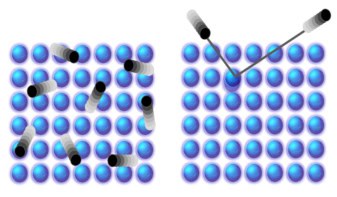Philosophers can learn much from a row in the physics community, says Robert P Crease

“It is a bad sign,” the Nobel-prize-winning theorist Steven Weinberg wrote recently, “that physicists who are most comfortable with quantum mechanics do not agree with one another about what it all means.”
Well, that’s Weinberg’s view. I don’t find those disagreements a bad sign – just a sign that philosophical issues are in play. Yes, quantum mechanics is full of puzzles. Is, for example, the wave function real or a book-keeping device? What does “reduction of the wave function” mean? And if the many-worlds idea is untestable, can it be true?
The meaning of quantum mechanics is made even more perplexing by several thought experiments that seem to reach impossible results. One is “Wigner’s friend”, in which an observer of a quantum measurement and an observer of that person are shown to make different statements about the quantum state being measured. Another is Schrödinger’s cat, in which quantum mechanics declares an unobserved feline to be half-dead, half-alive.
The meaning of quantum mechanics is made even more perplexing by several thought experiments that seem to reach impossible results.
One attempt to resolve these issues neatly is Quantum Bayesianism. Named after the 18th-century English statistician Thomas Bayes, Bayesianism is an approach to probability that’s been around theoretical physics ever since the US physicist Edwin Jaynes published a pair of papers in 1957. However, it only came to the wider attention of quantum physicists following a paper by Carlton Caves, Christopher Fuchs and Ruediger Schack in 2001 (Phys. Rev. A 65 022305).
In that paper, the authors reminded readers of Einstein’s conviction that quantum states don’t represent real states of affairs, only states of our knowledge. But rather than concluding that this reveals the incompleteness of quantum mechanics, as Einstein did, the authors embraced it. The probabilities derived from a quantum state, they said, are “subjective or Bayesian probabilities”. In 2010 Fuchs coined the catchy name “QBism” to describe things.
Probably true
To get a sense of what QBism is all about, remember that traditional – or “frequentist” – probabilities are objective and considered to represent states of the world. Walk into a casino and you’ll see this kind of probabilistic behaviour when balls land in a roulette wheel. In Bayesianism, by contrast, probabilities quantify degrees of belief or uncertainty – a simple example being rational betting behaviour.
Bayesianism is widely used in areas such as decision theory, behavioural economics, and artificial intelligence. When applied to quantum mechanics in QBism, it says, for example, that the probability of a measurement on a quantum system giving a certain result does not give us real information about the actual world. The probability is merely a guide to making the best decision about where, say, to find a particle.
One enthusiast is the US physicist David Mermin. In a 2013 interview, he said that probabilities in QBism “have a strategic aspect”. And since “strategy implies a strategist,” he continued, “in that sense quantum probabilities are subjective”. Measurements do not affect nature, but guide the measuring subjects in what to believe.
Quantum Bayesianism is thus a radical attempt to resolve quantum puzzles by treating its probabilities not as features of objective reality, but of subjective belief. It’s a participatory approach to physics. As Mermin declared in 2014 in Nature (507 421): “QBism put the scientist back into science.”
By regarding the wave function as less a real thing than an embodiment of available information, QBism eliminates a host of puzzles and paradoxes. The perplexing “reduction” of the wave function, for instance, is nothing more than an updating of information, a new quantitative guide to what it is possible to believe. The paradox of Wigner’s friend is resolved because Wigner and the friend have different information. As for Schrödinger’s cat, it is rescued from existential blurring because the wave equation only encodes what we non-cats currently know.
Access denied
Many physicists, though, aren’t sure about QBism. Michael Nauenberg from the University of California, Santa Cruz, for instance, has approvingly invoked Richard Feynman’s remark that, “Nature does not know what you are looking at, and she behaves the way she is going to behave whether you bother to take down the data or not”. QBists, Nauenberg charged, do not provide any experimental evidence falsifying this traditional view, nor any experiment confirming their own. “Quantum theory,” he concluded in 2015, “deals with the objective world as directly as does classical mechanics” (arXiv:1502.00123v1).
Philosophy, as I’ve said many times, can often be spotted in physics wherever an issue arises that can’t be resolved by more research. QBism is one such case. Though seemingly able to resolve puzzles in a straightforward way, it makes certain specific assumptions about the nature of reality – assumptions that philosophy can help to clarify and analyse.
Philosophy can often be spotted in physics wherever an issue arises that can’t be resolved by more research. QBism is one such case.
QBism, for instance, assumes that quantum mechanics is not about objective reality. QBists want to accept that there is a world beyond the scientist-subject, but also to say that, in the quantum realm at least, we can only have consistent beliefs about measurements of it. A scientist-subject can actively intervene in the world by taking measurements, yet in the quantum realm these interventions give rise only to theories that guide subjective beliefs by those scientists about the future results of interventions. As Fuchs put it in 2014, the statements of quantum mechanics “deal only with the object-subject relation” rather than with nature itself.
The critical point
QBism, philosophers would say, is “ontologically agnostic”. That basically means we are permanently denied access to whatever is “out there”; we’re stuck with only beliefs about interventions. QBism can, however, be clarified by comparing it with the philosophical approach known as “pragmatism”.

What philosophers do
Both QBists and pragmatists hold that our interventions change the situations in which they take place, and that there is no final truth. Pragmatists point out that the beliefs of scientists are not entirely subjective, for they are constrained by the rigorous judgments and work of the scientific community. A pragmatist lens thus seems to bring some clarification to QBist assumptions, allowing us to come closer to agreement on what it’s all about.



